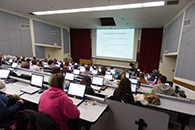Veterinary researchers find paperless classrooms, use of tablet computers benefit students, faculty
Thursday, June 5, 2014
MANHATTAN — A tablet is often prescribed by doctors for medical treatments, but what about a computer tablet for teaching students about veterinary medicine? A new article by researchers in the Kansas State University College of Veterinary Medicine explores the impact of this teaching tool in the new issue of the Journal of Veterinary Medical Education.
"The use of tablet PCs, or personal computers, has been investigated in many disciplines such as engineering, mathematics, science and education, but we wanted to explore student and faculty attitudes and experiences in veterinary medical education," said Hong Wang, coordinator of instructional technology and design at the veterinary college and co-principal investigator of the grant that led to the journal article. The other authors of this study were Bonnie Rush, professor and head of the clinical sciences department; Melinda Wilkerson, professor of immunology and clinical pathology; and Deon van der Merwe, associate professor in toxicology.
The College of Veterinary Medicine converted to a paperless classroom format when it began issuing tablet PCs in fall 2007 to incoming veterinary medicine students of the class of 2011. The tablet PCs are used by students to download, write and organize notes. These laptop computers include a touch screen and a digital pen or stylus that can be used for handwritten notes and drawings.
"Our study reports that the use of tablet PCs allows students to organize and search course notes more efficiently," Rush said. "The tablet PC program provides our faculty the potential to pursue technology integration strategies that support learning outcomes and provides students with problem-solving skills that support lifelong learning."
While the tablet PCs provide several benefits, there can be a downside to their usage. The study identified digital distraction as the major negative experience with tablet PCs during class time. However, there are tools and techniques available to the faculty to help limit distractions.
One faculty member's strategy was using a program called "DyKnow" to block noneducational resources in class. This is one of several software programs that allow students to only access resources needed for learning during class time, such as OneNote, Word, PowerPoint, Excel, Adobe Reader, dictionary sites, the course management system and the PubMed site.
"Overall, we are very pleased with the success of tablet PCs at K-State," said Ralph Richardson, dean of the College of Veterinary Medicine. "We are excited to be at the forefront of technology, and we are also excited to be at the forefront of research to show the real-world impact of this technology in our classrooms. This is the new paradigm in professional education, so it's very important that we continually review and evaluate our educational tools and strategies."
The article can be read at http://jvmeonline.metapress.com/content/b3083x8976751431/fulltext.pdf.

